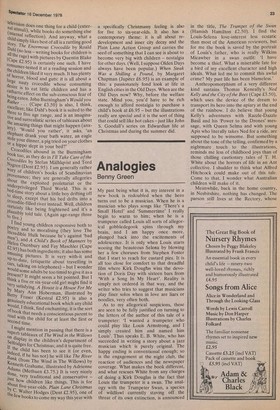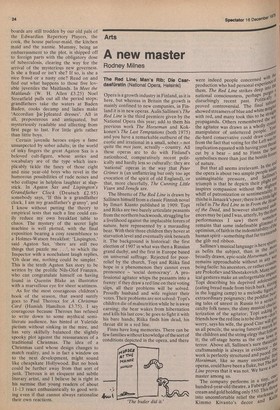Analogies
Benny Green
My past being what it is, my interest in a new book is redoubled when the hero turns out to be a musician. When he is a musician who plays songs like 'There's a Small Hotel' and 'Summertime' I really begin to warm to him; when he is a trumpeter called Louis all sorts of allegorical gobbledegook spins through my brain, and I am happy once more, plunged back into the excitements of adolescence. It is only when Louis starts wooing the beauteous Selena by blowing her a few choruses from Stephen Foster that I start to reach for custard pies. It is all too close for comfort to that dreadful film where Kirk Dougtas wins the devotion of Doris Day with sixteen bars from 'With a Song In My Heart'. Reality is simply not ordered in that way, and the writer who tries to suggest that musicians play finer solos when in love are liars or noodles, very often both.
As to my allegorical suspicions, these are seen to be fully justified on turning to the letters of the author of this tale of a trumpeter: wanted a trumpeter who could play like Louis Armstrong, and I simply created him and named him Louis'. Thus speaks E. B. White, who has succeeded in writing a story about a jazz musician which is purely original. The happy ending is conventional enough; so is the engagement at the night club, the reaction of audiences and the newspaper coverage. What makes the book different, and what rescues White from any charges of doing a Kirk Douglas is the fact that Louis the trumpeter is a swan. The analogy with the Trumpeter Swan, a species of wildfowl currently staving off the threat of its own extinction, is announced in the title, The Trumpet of the Swan (Hamish Hamilton £2.50). I find the Louis-Selena love-interest less ecstatic than most of the American reviewers, but for me the book is saved by the portrait of Louis's father, who is really Wilkins Micawber in a swan outfit: 'I have become a thief. What a miserable fate for a bird of my excellent character and high ideals. What led me to commit this awful crime? My past life has been blameless.'
Anthropomorphism of a very different kind sustains Thomas Keneally's Ned Kelly and the City of the Bees (Cape £3.50), which uses the device of the dream to transport its hero into the apiary at the end of the rainbow. I do believe that young Kelly's adventures with Razzle-Dazzle Basil and his 'Power to the Drones' message, with Queen Selma and with young Apis who literally takes Ned for a ride, are supposed to be winsome. But something about the tone of the telling, confirmed by a nightmare touch to the illustrations, reminds me less of childhood joys than of those chilling cautionary tales of T. H. White about the horrors of life in an Ant collective. I shudder to think what Alfred Hitchcock could make out of this tale. Come to that, I wonder what Australian children will make of it.
Meanwhile, back in the home country, in Nesbitshire, nothing has changed. The parson still lives at the Rectory, whose boards are still trodden by our old pals of the Edwardian Repertory Players, the cook, the house parlour-maid, the kitchen maid and the nannie. Mummy, being an embarrassment to the plot, is shipped off to foreign parts with the obligatory dose of tuberculosis, clearing the way for the arrival of the mysterious new governess. Is she a fraud or isn't she? If so, is she a nice fraud or a nasty one? Read on and find out what happens to those five lovable juveniles the Maitlands. In Meet the Maitlands (W. H. Allen £3.25) Noel Streatfield pulls out all the period stops; grandfathers take the waters at Baden Baden, cooks decamp and ladies make 'Accordian [sic ]-pleated dresses'. All in all, preposterous and antiquated, but mysteriously readable and affecting from first page to last. For little girls rather than little boys.
Certain juvenile heroes enjoy a fame unsuspected by sober adults; in the world of inky fingers the great Agaton Sax is a beloved cult-figure, whose antics and vocabulary are of the type which inexplicably tickle the fancy of those eight and nine year-old boys who revel in the humorous possibilities of rude noises and who collapse in helpless laughter at slapstick. In Agaton Sax and Lispington's Grandfather Clock (Deutsch £2.95) somebody says, `If this is a grandfather clock, I am my grandfather's granny', and I know without putting the theory to empirical tests that such a line could easily reduce my own breakfast table to chaos. The mystery of the secret light machine is well plotted, with the final exposition bearing a cosy resemblance to a Holmes-Watson breakfast: "Lispington.' said Agaton Sax, 'there are still two things that puzzle me . .', to which the Inspector with a nonchalant laugh replies, 'Oh dear me, nothing could be simpler.' This is the tenth Agaton Sax story to be written by the prolific Nils-Olof Franzen, who can congratulate himself on having found in Quentin Blake an illustrator with a marvellous eye for sheer scattiness.
As for the most courageous children's book of the season, that award surely goes to Paul Theroux for A Christmas Card (Hamish Hamilton 3.75). I say courageous because Theroux has refused to write down to some mythical semiliterate audience, has hinted at Yuletide pietism without sinking in the mire, and has very skilfully balanced the slightly spooky plot against the reassurances of a traditional Christmas. The idea of a Christmas card whose design changes to match reality, and is in fact a window on to the next development, might sound like cheapskate Hollywood. But no book could be further away from that sort of junk. Theroux is an eloquent and subtle literary artist, and I believe he is right in his surmise that young readers of about 11-13 react enthusiastically to good writing even if that cannot always rationalise their own reactions.



































 Previous page
Previous page